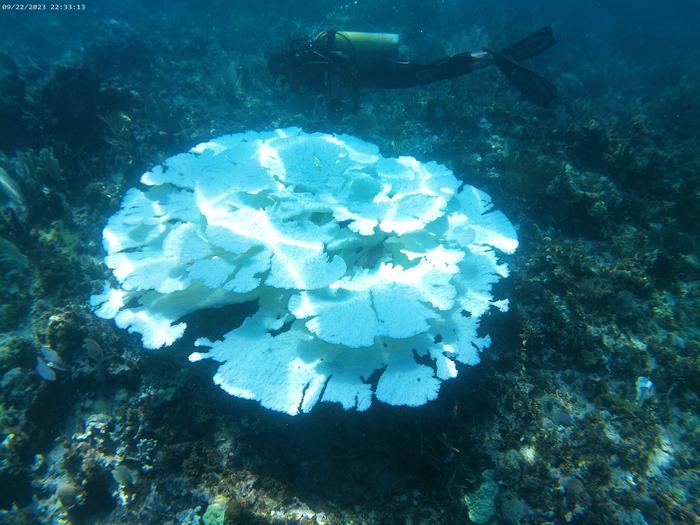A new paper in Oxford Open Climate Change, published by Oxford University Press, indicates that extensive bleaching and deaths are widespread at several major coral reefs around the world. This suggests that climate change has resulted in shifting patterns in ocean circulation. Coral reefs may soon be a thing of the past.

Credit: Sabine Hossenfelder/Oxford Open Climate Change
A new paper in Oxford Open Climate Change, published by Oxford University Press, indicates that extensive bleaching and deaths are widespread at several major coral reefs around the world. This suggests that climate change has resulted in shifting patterns in ocean circulation. Coral reefs may soon be a thing of the past.
Last year, 2023, was the hottest year in recorded history on land and in the oceans, with dramatic and unexpected temperature increases. The highest excess daily air temperatures recorded in 175 countries, as well the most prolonged excessive sea surface temperatures, were centered around Jamaica. 2023 marked the worst coral bleaching yet in the Northern Hemisphere, with the Southern Hemisphere poised to follow in early 2024. Researchers here used hotspot analysis, defining hotspots as surface waters with excess temperature more than one degree C above the average temperature of the warmest month at that site, as a predictor of coral bleaching. The paper is an application of the hot spot analysis on open-access ocean temperature data from satellite observations.
Areas of high 2023 coral bleaching mortality represent coral reefs included the entire Caribbean region, the east and west coasts of Mexico and Central America, Kiribati, Fiji, Eastern New Guinea, which local observers report to have near total bleaching and severe coral reef death. The entire Caribbean region, both islands and continental coasts, suffered severe excess temperature, with the longest duration of abnormal heating in the Haiti-Jamaica-Nicaragua-Honduras-Costa Rica area, along with the west coasts of Mexico and Central America.
The paper examined the spatial patterns and temporal trends of coral bleaching hotspot heat waves during 2023 considering their long-term changes to gain insight into changes in general ocean circulation and heat transport. Satellite sea surface temperatures are based on infrared emission from the sea surface. Changes in sea surface temperature result from changes in heat transport from the atmosphere due to changing winds and waves, horizontal changes in surface ocean currents, and vertical movement due to mixing of surface and deep water. Although satellite sea surface temperature measurements provide instantaneous images only of two-dimensional surface heat distribution, regional changes in temperatures can provide insight into changes into global heat circulation patterns.
The paper finds that all major warm currents show extreme warming during 2023, suggesting that heat transport from the tropics to the polar regions has accelerated. This is keeping the tropics relatively cool, making the heating greatest in sub-polar oceans. This accelerates polar ice melting and increasing ocean stratification, all major global warming feedbacks not captured by Intergovernmental Panel on Climate Change (IPCC) projections.
The 2023 distribution of severe heat and bleaching follows both spatial patterns and historical trends first shown from a baseline 1982-2001 trend analysis. Increased warming of both hot and cold ocean currents shows that horizontal mixing of tropical heat to the poles is accelerating, and that vertical mixing with cold deep water is slowing down, which will cause sea surface temperature to increase even more rapidly.
“Coral reefs, the most vulnerable of all ecosystems, began to bleach and die from high temperatures starting in the 1980s. Most coral around the world has been killed, and survivors can’t take more warming,” said the paper’s lead author, Thomas Goreau. “The sudden rise in global temperature during 2023 further imperils coral reefs, and indicates large-scale changes in ocean circulation are underway, causing positive feedback that amplify global warming, which are not included in IPCC models.”
The paper, “2023 record marine heat waves: Coral Bleaching Hot Spot maps reveal global sea surface temperature extremes, coral mortality, and ocean circulation changes,” is available (on May 9th) at https://academic.oup.com/oocc/article-lookup/doi/10.1093/oxfclm/kgae005.
Direct correspondence to:
Thomas Goreau
Global Coral Reef Alliance
37 Pleasant Street, Cambridge, MA 02139
goreau@globalcoral.org
To request a copy of the study, please contact:
Daniel Luzer
daniel.luzer@oup.com
Journal
Oxford Open Climate Change
Method of Research
Observational study
Subject of Research
Not applicable
Article Title
2023 record marine heat waves: Coral Bleaching Hot Spot maps reveal global sea surface temperature extremes, coral mortality, and ocean circulation changes
Article Publication Date
9-May-2024
COI Statement
N/A



